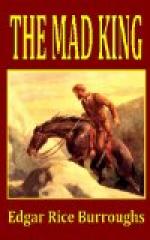The road ahead was comparatively straight and level. Behind him came the enemy. Barney watched the road rushing rapidly out of sight beneath the gray fenders. He glanced occasionally at the speedometer. Seventy-five miles an hour. Seventy-seven! “Going some,” murmured Barney as he saw the needle vibrate up to eighty. Gradually he nursed her up and up to greater speed.
Eighty-five! The trees were racing by him in an indistinct blur of green. The fences were thin, wavering lines—the road a white-gray ribbon, ironed by the terrific speed to smooth unwrinkledness. He could not take his eyes from the business of steering to glance behind; but presently there broke faintly through the whir of the wind beating against his ears the faint report of a gun. He was being fired upon again. He pressed down still further upon the accelerator. The car answered to the pressure. The needle rose steadily until it reached ninety miles an hour—and topped it.
Then from somewhere in the radiator hose a hissing and a spurt of steam. Barney was dumbfounded. He had filled the cooling system at the inn where he had eaten. It had been working perfectly before and since. What could have happened? There could be but a single explanation. A bullet from the gun of one of the three men who had attempted to stop him at the second outpost had penetrated the radiator, and had slowly drained it.
Barney knew that the end was near, since the usefulness of the car in furthering his escape was over. At the speed he was going it would be but a short time before the superheated pistons expanding in their cylinders would tear the motor to pieces. Barney felt that he would be lucky if he himself were not killed when it happened.
He reduced his speed and glanced behind. His pursuers had not gained upon him, but they still were coming. A bend in the road shut them from his view. A little way ahead the road crossed over a river upon a wooden bridge. On the opposite side and to the right of the road was a wood. It seemed to offer the most likely possibilities of concealment in the vicinity. If he could but throw his pursuers off the trail for a while he might succeed in escaping through the wood, eventually reaching Tann on foot. He had a rather hazy idea of the exact direction of the town and castle, but that he could find them eventually he was sure.
The sight of the river and the bridge he was nearing suggested a plan, and the ominous grating of the overheated motor warned him that whatever he was to do he must do at once. As he neared the bridge he reduced the speed of the car to fifteen miles an hour, and set the hand throttle to hold it there. Still gripping the steering wheel with one hand, he climbed over the left-hand door to the running board. As the front wheels of the car ran up onto the bridge Barney gave the steering wheel a sudden turn to the right, and jumped.
The car veered toward the wooden handrail, there was a splintering of stanchions, as, with a crash, the big machine plunged through them headforemost into the river. Without waiting to give even a glance at his handiwork Barney Custer ran across the bridge, leaped the fence upon the right-hand side and plunged into the shelter of the wood.




